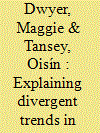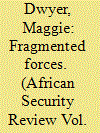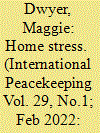| Srl | Item |
| 1 |
ID:
177066


|
|
|
|
|
| Summary/Abstract |
Coups and mutinies have often been treated as broadly equivalent types of behavior. However, they are distinct forms of indiscipline carried out by different sets of actors and have fundamentally distinct goals. This article makes two contributions to the scholarship on both coups and mutinies. First, we offer the first systematic attempt to compare their rates and illustrate the difference in their frequency over time, drawing on data from West and Central Africa. In particular, we identify a striking divergence in the frequency of coups and mutinies over time as well as a set of fluctuations that coincide with the end of the Cold War. Second, we build a new theory to explain these divergent trends. We focus on the role of agency within the military and argue that the upheavals associated with the end of the Cold War were experienced in different ways by junior and senior ranks within armed forces. This, in turn, helps account for variation in the coup and mutiny attempts.
|
|
|
|
|
|
|
|
|
|
|
|
|
|
|
|
| 2 |
ID:
156544


|
|
|
|
|
| Summary/Abstract |
This article provides a detailed look at the history of the Gambia Armed Forces (GAF), a military that has received very little academic attention within the study of African state security forces. It identifies key turning points in the GAF’s history, and highlights the vastly different roles the military played in the state under President Jawara (1965–94) and President Jammeh (1994–2017). Yet, it also highlights important similarities regarding internal patterns within the armed forces and shows the ways in which these continuities may challenge attempts to restructure the security sector. The article draws on archival research and interviews conducted with retired and active duty Gambian military personnel, government officials, and Gambian scholars.
|
|
|
|
|
|
|
|
|
|
|
|
|
|
|
|
| 3 |
ID:
186076


|
|
|
|
|
| Summary/Abstract |
Through the case of the Sierra Leonean deployment on the African Union Mission in Somalia (AMISOM), this study argues that family-related stress is an often-overlooked challenge in peacekeeping deployments. Using in-depth interviews with Sierra Leonean soldiers who were part of the deployment, military decision makers, and foreign advisors, this article lays out specific factors that created family-related tensions and contributed to lowered morale for Sierra Leonean peacekeepers. It demonstrates that the family-related stress on deployment is not only an issue of family separation, it is entangled with the historic trajectories of the armed forces and the sending country’s socio-economic conditions. The focus on Sierra Leone highlights the additional and unique burdens that soldiers and their families may endure in troop contributions from lower-income countries.
|
|
|
|
|
|
|
|
|
|
|
|
|
|
|
|
| 4 |
ID:
191638


|
|
|
|
|
| Summary/Abstract |
This research explores a classic predicament of authoritarian leaders—the need for a strong security force to deter opposition alongside a fear of the threats that a strong force could pose. By providing a unique view into the security services in The Gambia under President Jammeh (1994–2017), it argues that fostering uncertainty was the key tool in maintaining control of the armed forces. It situates this approach in the context of wider theories of institutional arbitrariness. The research demonstrates how unpredictability was operationalized through multiple, overlapping practices targeting both the structural level and routine aspects of military life. It also looks at international opportunities as an avenue to mitigate some of the negative effects of pervasive uncertainty in the forces. The research provides new insights into the internal dynamics of state security forces by drawing on data newly available after The Gambia’s democratic political transition of 2017. This includes interviews with members of the forces, testimonies from the Truth, Reconciliation, and Reparation Commission (TRRC), court martial transcripts, and other government reports.
|
|
|
|
|
|
|
|
|
|
|
|
|
|
|
|
| 5 |
ID:
151494


|
|
|
|
|
| Summary/Abstract |
In Burkina Faso in 2011 military mutinies followed widespread civilian protests, indicating a crisis of confidence in President Compaoré. Through an in-depth examination of the events, this article encourages an understanding of military revolts that extends beyond the military. Although the mutineers never united with the demonstrators, their grievances mirrored those of the civilians. The article puts the revolts into a historic context and shows a pattern of interconnectedness between military revolts and civilian demonstrations in Burkina Faso. The work draws on interviews conducted with military personnel and civilians involved in the widespread protests.
|
|
|
|
|
|
|
|
|
|
|
|
|
|
|
|